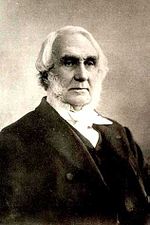- Osmond Fisher
-
Reverend Osmond Fisher (17 November 1817, Osmington, Dorset, England – 12 July 1914, Huntingdon, England) was an English geologist and geophysicist.
Fisher worked on the geomorphology of Norfolk, as well as the stratigraphy and invertebrate fossils of Dorset. He had published The Physics of the Earth’s Crust (1881), in which he described the mechanism of plate tectonics through a convection current in the Earth's molten interior. This was the most prominent work on the topic since Alexander von Humboldt, however it went largely ignored until the work of Alfred Wegener.[1][2] Much of his work into continental drift went ridiculed, while other geologists of the time clung to their Solid State Theory. However his observations were all based on careful scientific deductions rather than simple speculation.[3] He also published theories on the moon, proposing that the Pacific Ocean was the mark left where the moon split from the earth. However the Pacific Ocean is both chemically dissimilar and much younger than the moon.[4] He was also the author of the first geophysics textbook.[2] He was the recipient of the Murchison Medal in 1893 and the Wollaston Medal in 1913.
Notes
- ^ Geological Society; Rev. Osmond Fisher. Retrieved on 2006-07-02.
- ^ a b Wolfram Research; Fisher, Osmond (1817-1914). Retrieved on 2006-07-02.
- ^ Şengör, Ali Mehmet Celâl (2003-01-01). The Large Wavelength Deformations of the Lithosphere. Geological Society of America. p. 234. ISBN 0-8137-1196-7.
- ^ Harland, David M (2001-01-01). The Earth in Context. Springer. p. 59. ISBN 1-85233-375-8.
Categories:- Geophysics stubs
- 1817 births
- 1914 deaths
- People from West Dorset (district)
- English geologists
- English geophysicists
- English clergy
- Wollaston Medal winners
Wikimedia Foundation. 2010.

